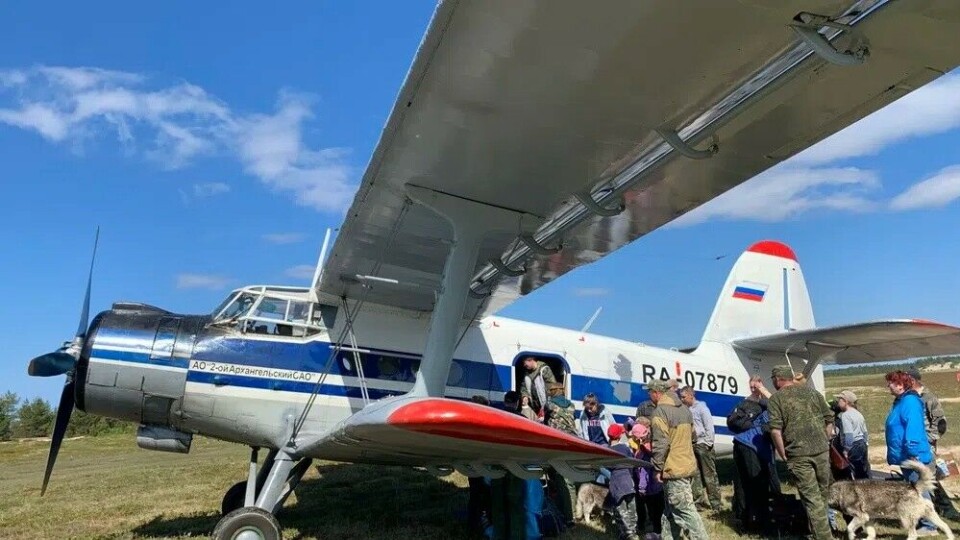
"We are on our own and Russia is on its own"
There is not a single small airport left in the Arkhangelsk Region. This is a report from the Pomorie where the sky has been taken away from the people who live here.
By Tatiana Britskaya
“We will collect the bags later,” says our red-bearded pilot. He looks like Prince Harry in his perfectly ironed uniform shirt as he makes his way through the An-2’s cabin, giving us all paper bags out of a package.
“And what about Pampers?” a passenger inquires.
“Pampers are only for the pilots!” replies our “prince” with a broad smile.
The “Annushka” is filled with trunks and boxes. They are bringing things like food, buckets and tubs, an electric oven and a cake in a box. There are no roads where we are heading to.
“Lock down anything that might go flying”
As of the beginning of June, there is not a single small airport in the Arkhangelsk region. Michael Mishustin, the Prime Minister of Russia, has signed article 50 of the Air Code of the Russian Federation which states that “All civil aviation airfield services are to be closed indefinitely.” And then there is a list of airports to be shuttered. Later, there are several nuances listed as explanations: the planes will continue to fly but what was previously known as airports or airfields will now be listed under the title of “landing sites”. This new designation is only a formality, nothing will change.
“It is impossible to close what is not there,” comments Ilya Ikonnikov, director of the former airport in Letnyaya Zolotitsa, one of the names on Mishustin’s list. Ilya was transferred here from Onega when the airport there was closed in 2015. A road was built to the city and people stopped flying.
“Where could they get the money for a ticket? There are only 18 thousand people in Onega and over 5 thousand of them are unemployed.
One day I was leaving a store and some grandmother approached me with her hands out. She said, “Please son, did you buy any bread? Please, can you break off a piece for me? I haven’t had anything to eat for two days.” I gave her the whole loaf and she ate it right there on the street. Where would this woman be flying? What does she need an airplane for?
In the city, there is the main enterprise zone plus several points where they collect ferrous and non-ferrous metals. Six-year-olds start their careers collecting beer cans. Older people remove the decorations from the tombstones in the cemetery for some pocket money. Adults have scavenged the metal monuments and anything else they can get their hands on. In autumn, our fuel depot had six tanks, now there is only one left. They just took them and handed them over for scrap. People walk around with metal detectors looking for cable. There can be no talk of any airport revival. This city has been degraded too far. There is simply no one left to fly.”
The Ikonnikovs have a dynasty of flying. Ilya’s Grandfather, father and uncle all worked in aviation. His father flew and his grandfather and uncle worked for ground services. Ilya also dreamed of going to flight school. But the year he graduated, there was no money at all in the budget. He went into the philology department instead and on July 1, 1997, he also took a job as the airfield correspondent at a regional newspaper and began his career as an aircraft watchman.
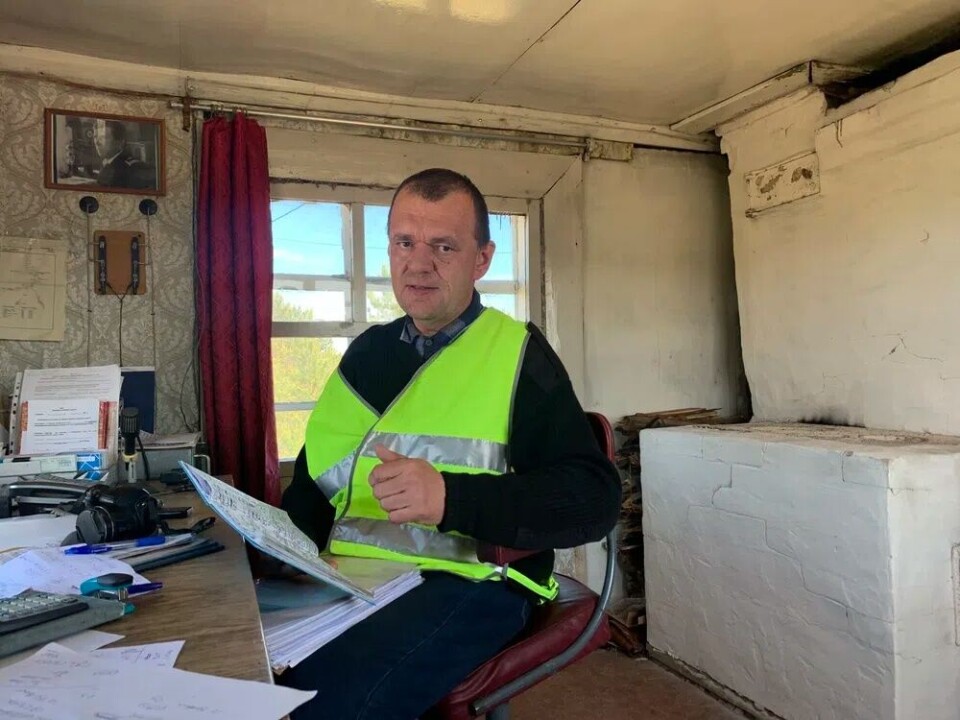
Ilya left the newspaper in the mid-2000s when articles about rural life and simple local incidents suddenly had to be sent to the regional government for approval. Ilya is also a poet and recently had a book published. Of course, he still loves airplanes and is working on a historical archive of the history of Arkhangelsk aviation. A year ago, a museum was opened at the airport in neighboring Lopsheng. Ilya has enough material for two such museums.
At the airport, he is the director, dispatcher, cashier, watchman and cleaner. He also sometimes chases the bears off the runways with a broom. In the neighboring Verkhnyaya Zolotitsa, a bear stormed the air terminal one day breaking the windows with its paws. In Onega, when the airport was operating, they often had to chase the cows off of the runway. Once Ilya himself flew An-2 as a co-pilot.
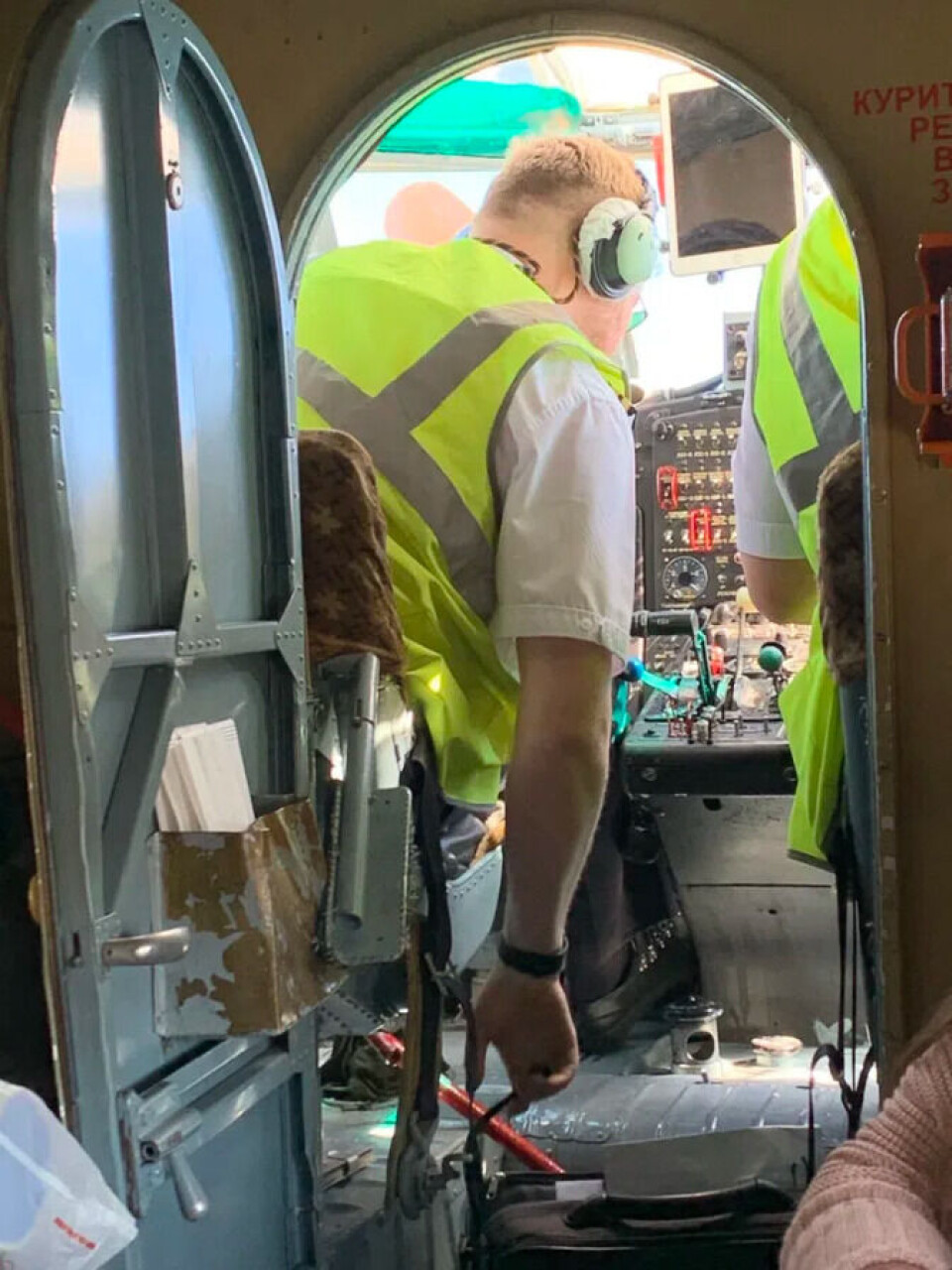
The airport is heated by a wood stove. The floorboards creak. The old doors are heavy to open. The waiting room has Soviet era baggage weights preserved on the ground floor along with the cashier’s window and Aeroflot posters.
“To maintain the status of “airport”, we must meet the same requirements as Pulkovo airport in St. Petersburg or Sheremetyevo in Khimki,” Ikonnikov explains, “They have lit runways. But we don’t always have electricity and the village lives on diesel. They also have rules that body searches should be carried out in the presence of law enforcement officials. We don’t even have police precinct. So back in 2015, we were transferred to the status of landing site by order of the squadron chief. The government hesitated, apparently they were expecting that we would somehow bring ourselves into line. But how were we supposed to do that? We have our social function so the flights have always been partially subsidized by the region. But a year ago they told us to lower our prices another 30% so more people could afford to fly. Now we do not have enough money from flying to cover our debts.
These days, you can get from Letnyaya Zolotitsa to Arkhangelsk for 3360 rubles, about 40 Euro. A visit to the polyclinic or the public services center in Norilsk costs about twice that. We carry the entire responsibility for small aviation in the region. But to stay in business, we will have to go down to the bone. We will have to get rid of all those waiting rooms with the stoves and firewood, all of the control rooms and all of the people working in them. The airports can only be closed by the prime minister but the director of any airline can quit service if it fails to be profitable. Why in a country where we celebrate the victorious stability of the state do we close old airports for being “inappropriate” instead of re-equipping them?”
Ilya does not understand. He talks dreamily about the small aircraft business in neighboring Norway. There they fly people from the villages along the coast to the city to work. And no one complains if the service runs at a loss. People are comfortable and this is all that is important.
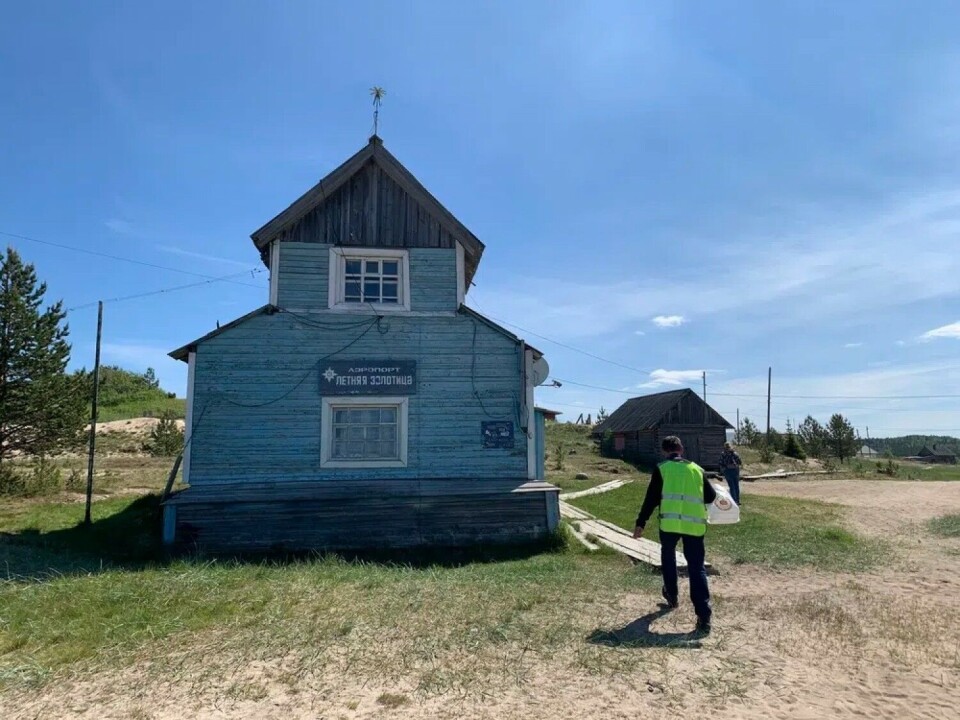
“We used to go to monasteries, now we go to airports”
The skeleton of an old karbas fishing boat creates slanting rays of lights at low tide. It is like the skeleton of a whale who had beached itself belly up. The Pomors have a custom of leaving their boats on the shore and giving them back to the sea. No one ever disassembles them for firewood or scrap metal. A fishing boat to them is like a person who lives and dies. All living things, both during their lifetimes and after, deserve respect.
The karbas graveyard is at the mouth of the river where the river merges with the sea. In this place, the sky also merges with the water and life with eternity.
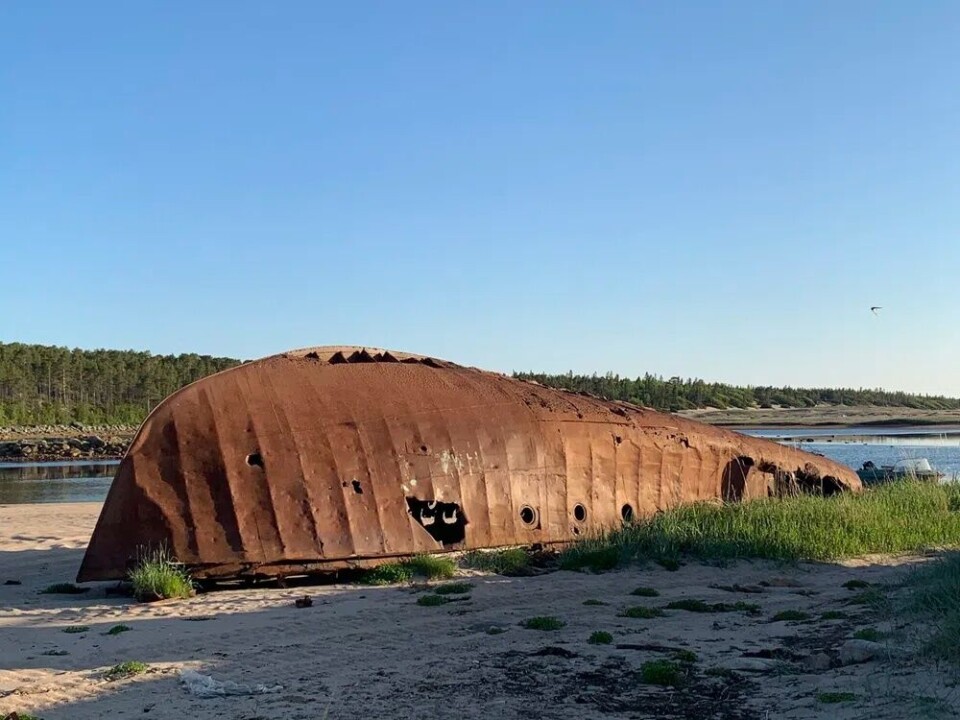
Gold was once washed from the rivers here, hence the name. Now only dandelions are golden in the village and the population has dwindled to just 158 people. There is no mobile connection. There are three streets, Upper, Middle and Lower, a first-aid post, a chapel and a food store, the door of which is simply propped open in the evening with a stick according to village custom. Nobody takes from anyone else. There are no strangers.
In summer, Zolotitsa becomes part of the Kenozersky National Park. There are tourists who have separate garbage collection in every house as well as hope for life. True, richer tourists do not fly on the local “corn farmer” flights. They usually arrive on private helicopters at the expensive eco-hotel with the “Sergei Yesenin suite”. That story by the way is a lie. Guests are told that the poet married Zinaida Reich here but the truth is that they got married near Vologda.
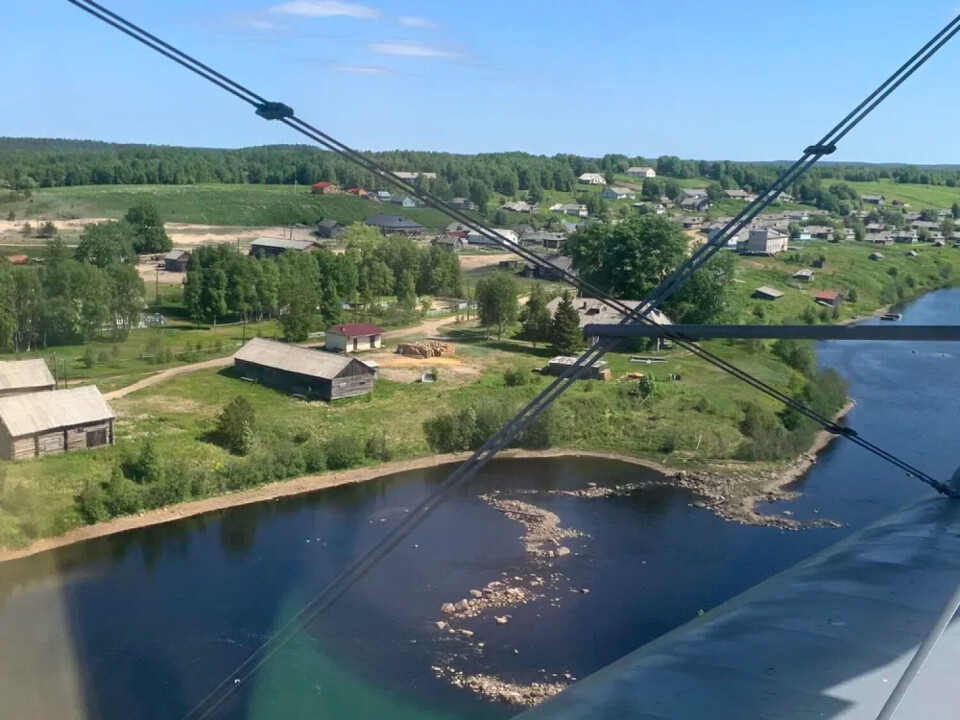
It is almost impossible to buy a ticket from Arkhangelsk to Zolotitsa or to any of the other outlying Pomor villages in advance. Only three tickets are sold online through the agency for each flight and the rest is by appointment only.
You need to call Vaskovo airport, make an appointment, show up early in the morning and wait to see if there are enough seats. If there are a lot of people, they can send a second flight. But if there are more people or corn than the plane can hold, you will have to wait for the next day.
I still had my ticket but one of the corn-growers fell ill while the plane was still on the runway. The pilots managed to return the man to the parking lot by car and changed the boarding list. “Prince Harry” joked and smiled about it and quietly told a colleague from another flight only after landing that the engine had been choked on takeoff and that it was probably a good time to light a candle in the church.
Now there are four flights a week in Summer. In winter there will be two. The load is seasonal. In the spring, the children get taken away after getting picked up in front of the school. In late autumn, the “snowfall-grandmothers” leave. This is Ilya’s joking way of talking about grandmothers who only live in their native villages until the snows come. He writes down those who want to fly in a school copybook and there are days when all the columns are filled. Usually this is for funerals when relatives come to pay their respects. And there are laconic entries like “No flight.” In the low season, Ikonnikov often goes along for the ride. This is his way of showing support for the cause. If there are no passengers, the entire service will be closed.
“We used to take excursions to monasteries. Now there are people who come to see the remnants of old airports. People have already written to me from Novosibirsk and Magnitogorsk. “What sights do you have? How many times a day can you fly to Solovki?” The islands, which are 40km away, can be seen from the control room but the flight there is only from Arkhangelsk. There used to be flights from these small airports to many places.
It is also important to know that the airstrip can be closed if the conditions get too muddy. But we honestly try our best not to close and last fall when we were washed out, I managed to get the flights off by using the secondary safety strip. I had to negotiate a deal with the pilots for that. And then twice a year, our army which has risen from its knees, intervenes and the air defense command closes the sky for exercises. Sometimes, there is simply no way to get a patient to the hospital no matter what.”
Ilya has a photo of one of his inventions. It is a homemade “snowplow” made of two logs lashed together with a rope. In winter, they are attached to a tractor and used to level the snow on the airstrip. The “Annushka” can then calmly land on skis.
In April, Ikonnikov was sent to his small homeland in Onega for three months to help to manage helicopter flights for a group of geologists. While he was there, he basically restored the air terminal by himself. He put in new windows, the frames coming after some begging from a local church which was more affluent than the airport. He repaired the wiring, welded a new battery into the control room and adjusted the heating system. He also rather proudly tells a story about helping land an ambulance helicopter by manually clearing the site with a shovel and signaling with a lantern. I asked him what would have happened had he not been there. “There was a woman in labor whose water had broken. If we hadn’t managed to land the flight, they would have waited until morning. Who knows whether they would have made it or not.”
And there is one more story about an emergency landing in Izhma by a Tu-154 with passengers who luckily, just happened to see the airstrip in the taiga. That landing was possible because the same sort of director at the now closed airport, Sergei Sotnikov, had made sure to keep his airstrip clean for 7 years.
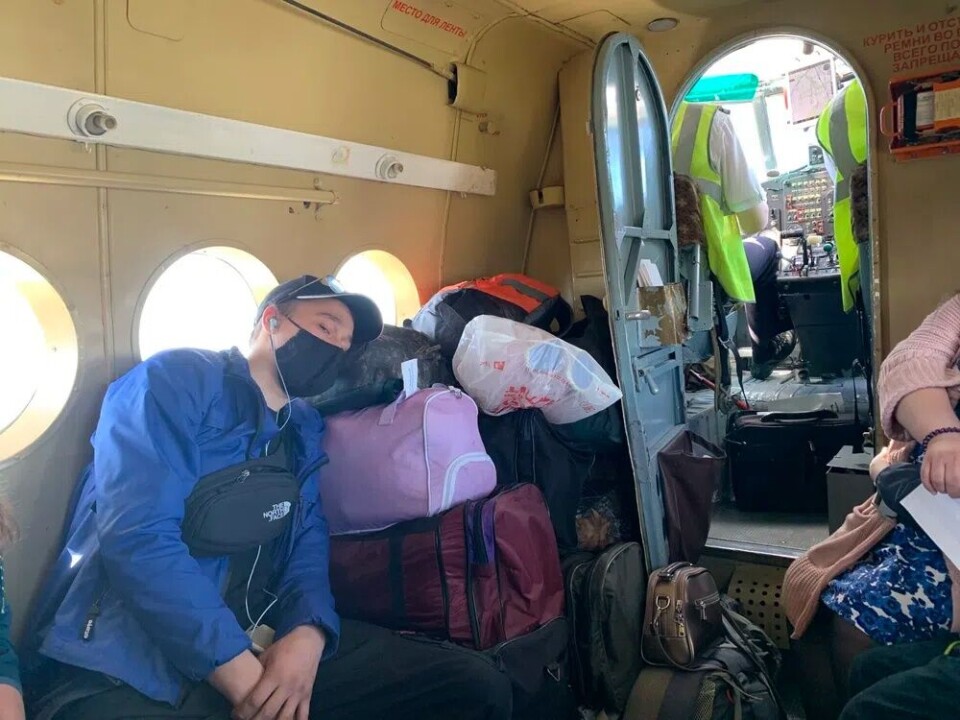
“People, fish, work”
On the street near the airport in Vaskovo, visitors are greeted by a sign. “Border zone. No entrance without a pass.” Of course, there is no border in the Arkhangelsk region but there are border guards who usually show up when salmon are available.
They are trying to keep me off the flight to Mezen. They are demanding to see my pass. The actual fact is that a pass is not needed. According to order No. 454 from the director of the FSB, Russian citizens visiting the border zone can fly if they can present a basic civil passport. It is even a surprise to find out there is a border along the shores of the inland seas. The argument goes on for a long time about who is more knowledgeable about orders. I eventually manage to get on the flight despite their promises to have me sent back in Mezen.
Alexander Kotkin is a Pomor and is therefore pragmatic about the border patrol. “It is 1200 km to the border but border guards are a dime a dozen. Their salaries are from 100 to 150 thousand (about 1000 to 1500 Euro). Mostly, they are interested in the fish,” he says.
“There was a situation one time when a 75-year-old grandfather, who could barely walk, asked his sons to take him to the seashore to their fishing hut. “I will drink tea and watch the sea.” he said. So, they took him there and left him to drink his tea and watch the sea but that night, the border guards broke into the hut with machine guns and threw him out of his cot shouting, “Where is the fish, grandpa?”
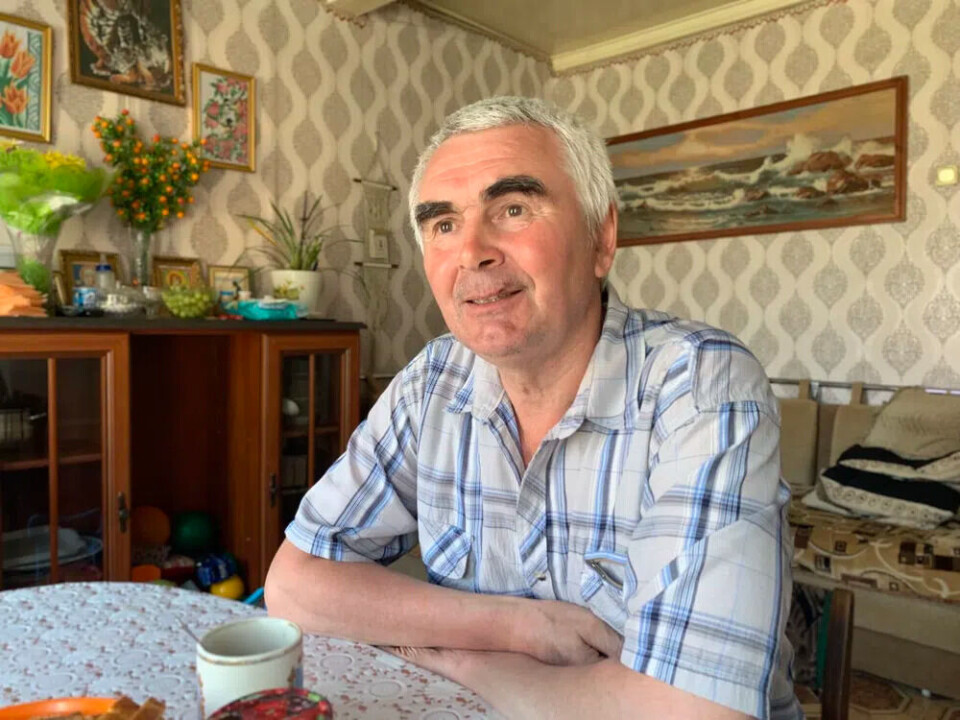
It’s good that he didn’t die. The siloviki, the politicians who started their careers in the FSB, always sit and wait in the wheat fields. All of Russia is one big wheat field.”
Kotkin came here and bought a house 40 years ago. Later on, he found out that the house he bought stood exactly on a piece of land once held by one of his ancestors. Kotkin is the last Pomor in this region. He is the last Pomor to live by the sea. The last dock in Mezen suitable for navigation is in the courtyard of their house. Kotkin is the last of the Mezens who went to sea in fishing boats.
30 years ago, Mezen was still a large city. Planes flew here from Arkhangelsk every day. Now, it is only twice a week. Kotkin is indignant.
“All of the production facilities that were here are now gone. There was a meat processing plant. The herd used to have 10,000 head but now only 100 remain. There was a fish processing plant and a powerful sawmill. We have a natural anomaly in that we have very large sea tides, up to 16 meters. We have the third highest tides in the world. The meadows get flooded with sea water and this gives our cheese a very particular taste. Once upon a time, our cheese was exported to France. Now everything has been destroyed. The budget grew to incredible proportions. But where was it a budget? It was just legalized parasitism. Well, not medicine or education, of course. But we had so many officials just shifting papers. They were paying people 40 thousand in the recreation center and policemen got almost 70. And suddenly, nobody was going out to sea. I went to a fishing conference in Norway. All their officials and businessmen said the same three words, “People, fishing and jobs”. But when our officials began to speak, I never heard any words like this.”
There is sand everywhere in Mezen. It rustles along the wooden sidewalks and gets into your eyes. Against the background of the old wooden houses, there is a post office made of silicate bricks. A typical new school stands behind a huge lattice fence. Everything else here is small. Planks and logs. Only 3000 people remain to be counted. It is rural life. There are potatoes in the gardens along Sovetsky Avenue. But still, it is a town.
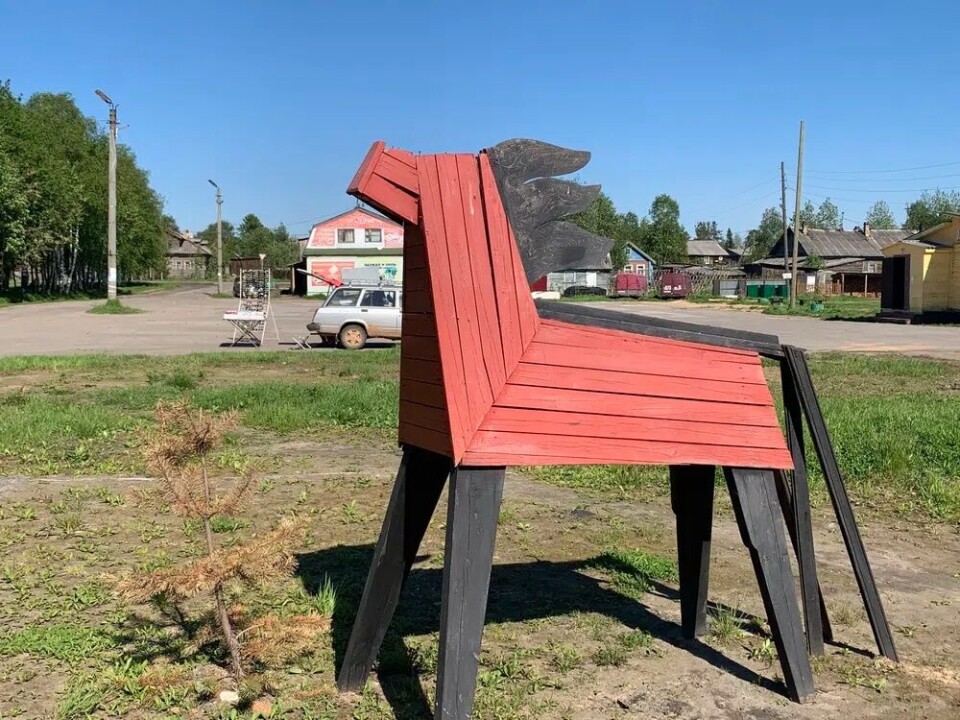
Kotkin sums it up by saying, “It is stupidity, of course, but since Catherine II decided to call Mezen a city, nothing has changed.”
Mezen is also famous for its painting. There are depictions of red thin-legged horses on all wooden surfaces. There is also a life-size wooden horse in the dusty square. The fishery has long since died out but the Mezen red horses remain as souvenirs for tourists.
You can take a bus to the city from the airport where the runway is covered with metal plates. It costs 23 rubles and in five minutes, you are in the center. In the center, there is a church, a huge Epiphany Cathedral from the 19th century. It is made of wood, of course. The dilapidated cathedral was handed over to the Russian Orthodox Church. They added plastic double-glazed windows, an iron door was cut into the end and the walls and roof were flooded with polyurethane foam.
The state however does not protect the cathedral. Nearby is a newly built log church where services are held. Behind the church, there is a concrete memorial to the soldiers of the Great Patriotic War. There are several anti-tank “hedgehogs”, behind which lies the overgrown riverbed. This river used to be a tributary of the Mezen. 30 years ago, it was even navigable. But then some official got tired of the annual expenses for the pontoon bridge so they built a makeshift dam and the river dried up. It dwindled down to a stream into which flows sewage from a pipe sticking out of the ground. The pipe, Kotkin says, comes from the newly built school.
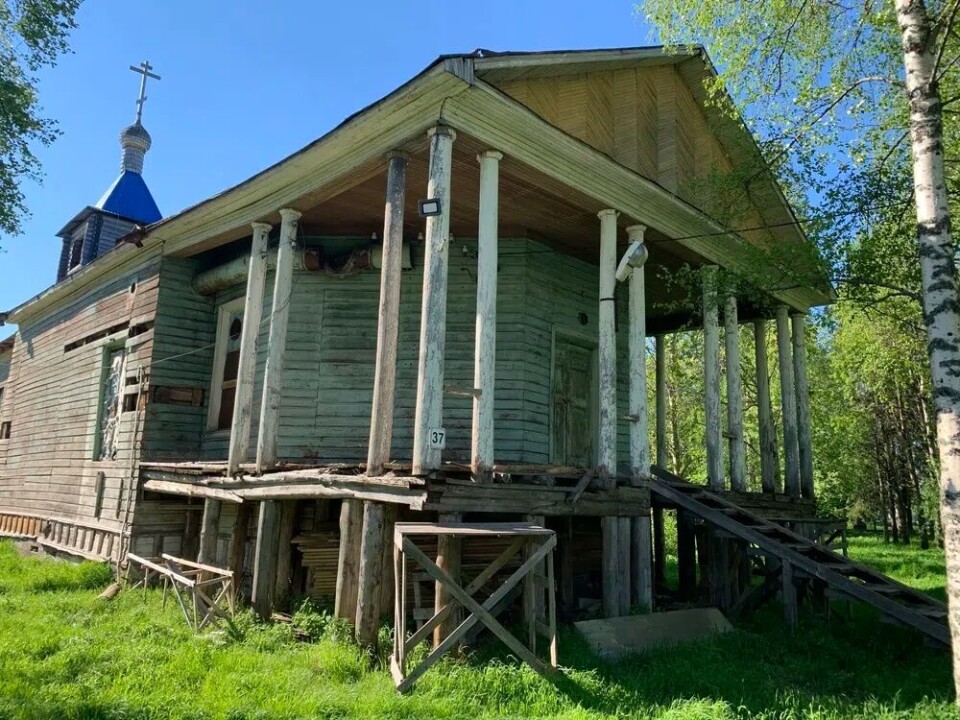
“Do not go there. The Nenets Sea is there”
Kotkin recalls his own history here. “They called me the ‘Mezen Kamikaze’. Once I went to Arkhangelsk for repairs but the state small vessel inspectors caught me. “Where did you get this, where is that?” But I have all the navigation equipment I need in my head. They looked at my compass and they were stunned. It should have been in a museum, they said, they could make an exhibit out of it.
I was taught the old way. From the age of seven, I went to sea with the men. No one gave me any lessons. I watched the elders do everything and repeated it. That’s how I learned. I just watched and learned everything.
Even though I haven’t gone to sea since childhood, I still wanted to be here in Mezen. I never had any major accidents. I must have been walking on the clouds or amongst the stars. But I am the only one who came back. On the sea, men were brought up real. But how can you grow up to be a real man in an office?”
A karbas fishing boat named Kotkina has been left near a fence. It is huge, big enough for 10 people. In her prime, it was possible to sail her or run her with a motor. But then, there was nowhere to go.
“I went to get a pass. There were new rules and suddenly, you couldn’t go out to sea without one. The border guards stopped me. “Don’t go to Kanin Nos. The Nenets Sea is there”. The Nenets Sea?!? You would think they would have at least looked at a map.”
A Pomorskiy “karbas” fishing boat runs 12 tours. Then she lives out a century on the shore. Recently, officials decided that the ship graveyard was spoiling the view so the old boats were sawed up and removed.
“The traditions are over. A new government has come,” sums up Kotkin. This new government personally came to Mezen before last year’s elections. The candidate for governor Tsybulsky listened to what the Pomor had to say, wrote down his telephone number and invited him to Arkhangelsk for a detailed conversation. But when Kotkin arrived, there was a reception but somehow, his name was not among those invited.
Alexander Kotkin leads me along wooden walkways and through a well-groomed courtyard. The flower beds are densely planted with tulips. The owner is a little embraced. “They say that I quarreled with my wife about what to plant in the garden and she said “flowers”. So now we have, like the song by Zvuki Mu, “Too many flowers in the garden.”
A plane is flying over us
But it will not land anywhere
The pilot thinks in vain
That the grass will not work
Too many flowers in the garden

Gardens are not a tribute to tradition. All food must be transported from Arkhangelsk by air. The prices are appropriate. A kilo of lopsided apples with wormholes in a “state store” costs 206 rubles. A kilo of potatoes runs 82.
This town by the sea lives today like a colony. They are completely dependent on the regional center. The entire budget is subsidized. The hospital has managed to survive and people say it even has decent surgery. But if you need to visit a specialist or a maternity hospital, you must go to Arkhangelsk. And if the plane doesn’t arrive, it’s a disaster.
“I do not remember being so hard pressed even in Soviet times. People went to sea. There were hundreds of karbas. There were traditions. I remember that I had a “Dora”, a flat-bottomed fishing boat. When I went to sea on it, my wife and three children were always on the shore waving after me. And they were there to meet me when I returned. That was the way it was. It was clean everywhere. I used to be able to walk from my home to the shore in slippers. We all said that the sea was in front of us and Russia is behind us. We were on our own and Russia was on its own too. But Russia did not like this and then they took the sea away from us. And now there is nowhere left to go.”
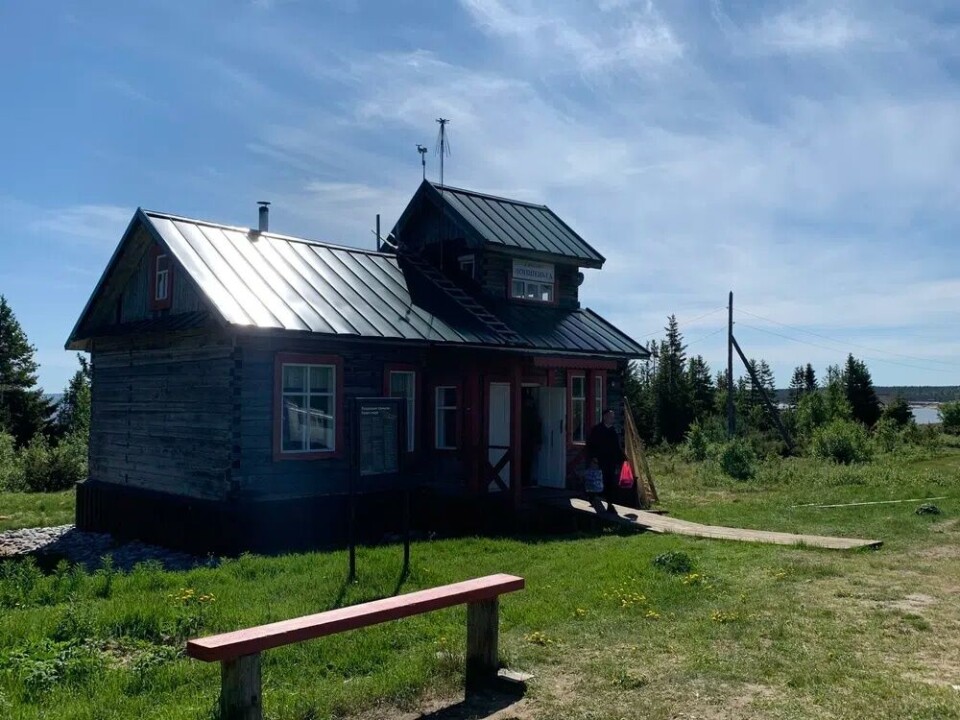
…I am alone on the flight from Letnyaya Zolotitsa to Arkhangelsk. There are no fellow travelers. In Lopshenga too, no one is waiting for a seat. Ilya Ikonnikov still makes his announcements. “Check-in time for the Letnyaya Zolotitsa - Lopshenga - Pertominsk - Vaskovo flight is ending.” And then he is also there to see the plane off. He gives the command from his tiny control room over the radio station “Angara”.
“Permission to take off granted. The runway is free.”















